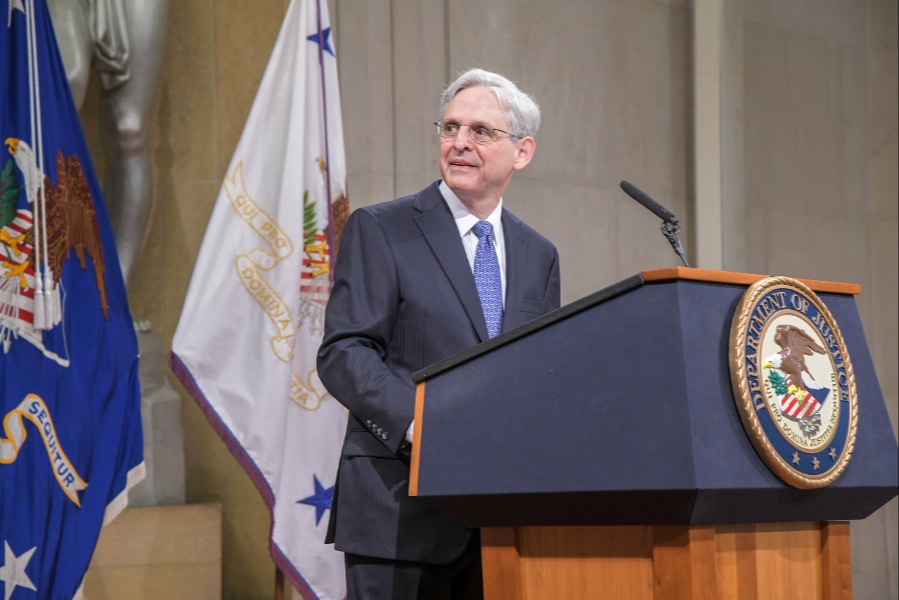The Situation: Merrick Garland Takes His Leave
Reading between the lines of the attorney general's farewell address

The Situation on Wednesday considered the president-elect’s nominee to run the Justice Department.
Today let’s spend a moment on her predecessor, Merrick Garland, who yesterday gave his farewell address to Justice Department employees in the Great Hall of the Main Justice building.
Outside the building, grandstands are going up along Pennsylvania Avenue, where flags and buntings line the street, for an inaugural parade to celebrate a man of almost cosmic indecency, a man committed to busting the norms of behavior of people inside the building, a man who has committed any number of crimes, a man who has stoked political violence and brought about innumerable threats against public servants.
Inside the Great Hall, Garland—a figure of consummate decency—is speaking to some of those very public servants. He makes only the most elliptical mention of what is coming.
He makes no mention of Trump or his crimes.
He makes no mention of how his nominated successor participated in the fraud of 2020 election denial.
He makes no mention of how the current FBI director—who speaks warmly of him at the event and presents him with a Tommy gun as a token of the bureau’s appreciation—may be replaced by a man who writes children’s books about fictitious plots against President Trump and published a list, on which both the current FBI director’s and Garland’s name appears, of “deep state” operatives who are “corrupt actors of the first order.”
Rather, he talks about the department, its people, the threats against them, and the norms and values it and they represent. He leaves the rest as subtext:
The closest he comes to mentioning Trump and his crimes and threats, apart from acknowledging the department’s work pursuing “accountability for [the Jan. 6] attack on our democracy wherever it led” (emphasis added), is a brief but fierce defense at the speech’s end of the apolitical nature of the department’s work:Our norms are a promise to treat like cases alike—that we will not have one rule for the powerful and another for the powerless, one rule for friends and another for foes.
They are a promise to ensure respect for the integrity of our career agents, lawyers, and staff, who are the institutional backbone and the historical memory of this Department.
They are a promise to ensure protections for journalists in law enforcement [investigations], because a free press is essential to our democracy.
Those norms include our commitment to guaranteeing the independence of the Justice Department from both the White House and the Congress concerning law enforcement investigations and prosecutions.
We make that commitment not because independence is necessarily constitutionally required, but because it is the only way to ensure that our law enforcement decisions are free from partisan influence.
We know that only an independent Justice Department can protect the safety and civil rights of everyone in our country.
And we know that only an independent Justice Department can ensure that the facts and law alone will determine whether a person is investigated or prosecuted.
We know that only an independent Justice Department can protect the safety and civil rights of everyone in our country.
Those norms have been woven into the DNA of generations of DOJ employees, career and non-career alike.
We know that only an independent Justice Department can protect the safety and civil rights of everyone in our country.
They are the commitments that ensure we will adhere not only to the letter of the law, but to the rule of law.
We know that only an independent Justice Department can protect the safety and civil rights of everyone in our country.
I ... know that a lot has been said about this Department by people outside of it—about what your job is, and what it is not, and about why you do your work the way you do it.
I know that you have faced unfounded attacks simply for doing your jobs, at the very same time you have risked your lives to protect our country from a range of foreign and domestic threats.
But the story that has been told by some outside of this building about what has happened inside of it is wrong.
You have worked to pursue justice—not politics.
That is the truth.
And nothing can change it.
I know that a lot is being asked of you right now.
All I ask of you is to remember who you are, and why you came to work here in the first place.
These norms seem to have no constituency right now.
One side of the political spectrum—typified by the Republican senators at the Bondi hearing—pretends that Garland himself is the agent of “weaponization” of the department. It ignores Trump’s unprecedented criminality in office and treats as the deviation from American practice only the need on the part of the Justice Department to investigate and prosecute that criminality. It treats the following of norms designed to avoid weaponization of the department as such weaponization. And it treats those who overtly threaten to deploy the coercive power of government against political foes as those who are depoliticizing justice.
Yet on the other side of the spectrum, Garland finds no quarter either. The venom for him on the left and center-left these days is just as harsh as it is in MAGA-world. He did not move fast enough on the Trump investigation. He did not get the job done—and we all know exactly what the job was. He appointed too many special prosecutors, rather than handling the matters himself. Most importantly, following all those norms he talks about so lovingly was weakness. A man who plays by Marquess of Queensberry rules in a gutter scrape is a fool.
The fundamental complaint about Garland among many on the left is that he did not weaponize the Justice Department.
Elie Mystal, for example, writing in the Nation back in February, blasted Garland for having a judicial temperament, for being an institutionalist, and for being “so desperate to appear ‘apolitical’ that he makes disgustingly political decisions every time it looks like Fox News might become angry with him.”
That the MAGA right and much of the left can agree to label Garland a disaster but cannot agree over whether that disaster lay in weaponization or refusal to weaponize is, I assume, what Garland was referring to when he talked yesterday about “criticism [coming] from people with political views opposite from one another, each making the exact opposite points about the same set of facts.”
And, indeed, if one takes that to be his meaning, one should understand his speech as a rebuke to the department’s critics, and his own, on both flanks.
The Trumpists and the Republican senators he is rightly branding as liars. “You have worked to pursue justice—not politics,” he said—and the word “you” here includes “I.” “That is the truth. And nothing can change it.”
Pam Bondi can’t change it. The angry speeches by Republican senators can’t change it. The will of the president can’t change it. The special counsel’s thousands of pages of evidence and argumentation speak for themselves.
When Garland urges the career employees of the department in an uncertain future “to remember who you are, and why you came to work here in the first place,” he is reminding them to hold the line—the line of apolitical law enforcement—against those who obliterate it even while accusing him of doing so. This is the MAGA right.
Yet there is also a rebuke to the left in Garland’s speech, though a subtler one. To the left and those frustrated that the Justice Department did not save us from Trump, to those who insist they knew the right time frame for the indictment or divined the strategy that would solve everything, Garland also has a message: Stop aspiring to weaponization.
When Garland insists that “[i]t is the obligation of each of us to follow our norms not only when it is easy, but also when it is hard—especially when it is hard,” he is not talking about Trump or the rancid senators.
When he insists that “[i]t is the obligation of each of us to adhere to our norms even when—and especially when—the circumstances we face are not normal,” he is not just talking prospectively about how to behave over the coming weeks, months, and years. He is also defending how the department did behave. That is, he is defending having followed the norms that the left excoriates him for observing even as the far right lyingly claims he abandoned them.
I said above that these norms today have no political constituency. But that is not quite right.
Outside the building, where the grandstands are going up and indecency will have its parade, the constituency is definitely rotting on the vine. Inside the building, by contrast, Garland receives a standing ovation for his words—and for the very performance over the past four years that has earned him such scorn elsewhere.
I have never worked in that building.
I do, however, share the enthusiasm for doubling down on these norms—rather than abandoning them while insisting that one’s opponents observe them. I share it because the alternatives are all horrible. I share it because I can neither forgive the politicization of justice Trump is promising—and find the lies in defense of it disgusting—nor do I aspire to imitate that politicization, not even to get Trump. And I share it because I don’t expect the justice system to save us all from our reckless political choices.
So count me with Garland, even if I’m one of the last people outside the building to be so.
The Situation continues tomorrow—though without Merrick Garland and so many other decent public servants we choose to revile.



.png?sfvrsn=48e6afb0_5)

